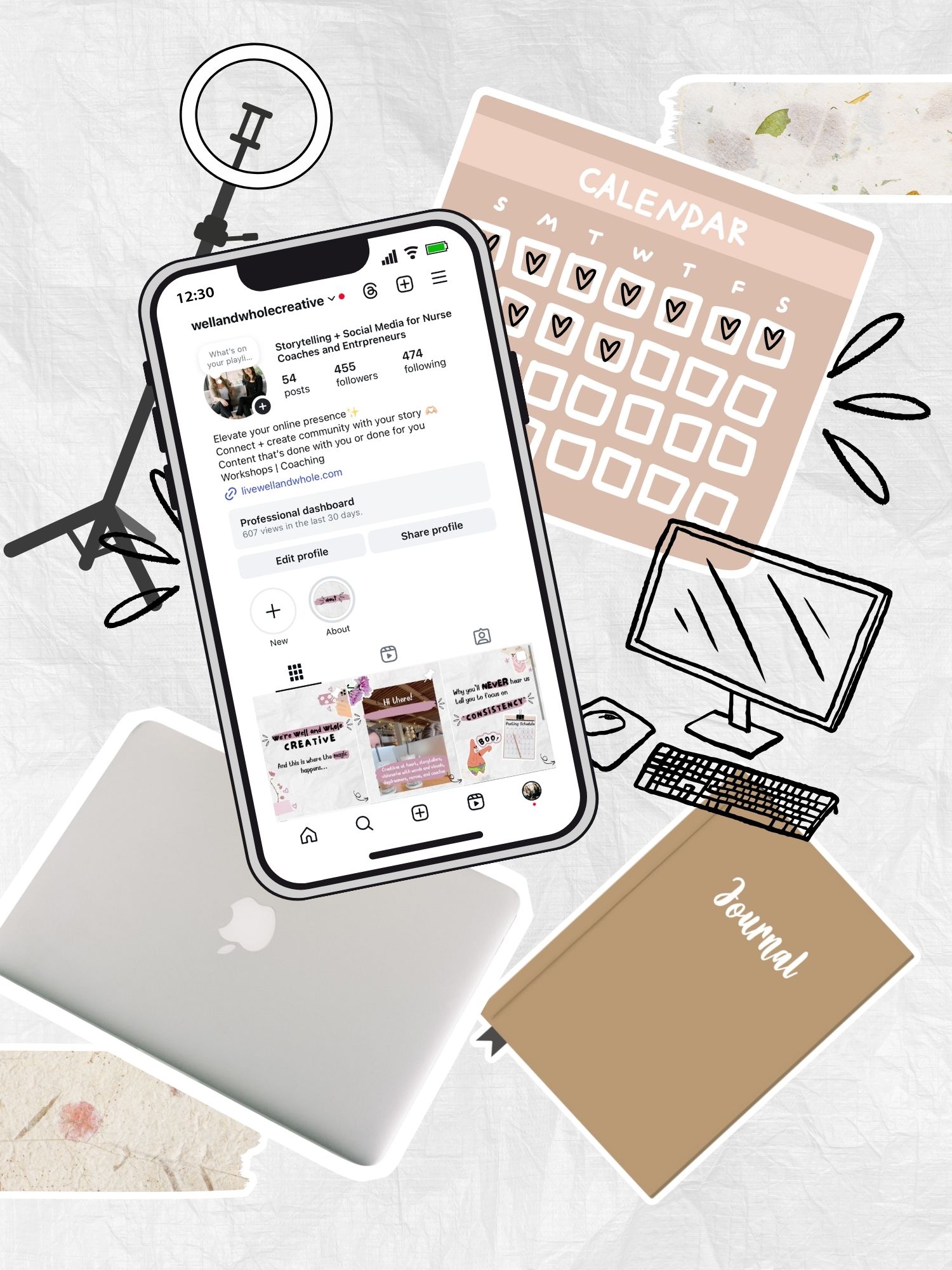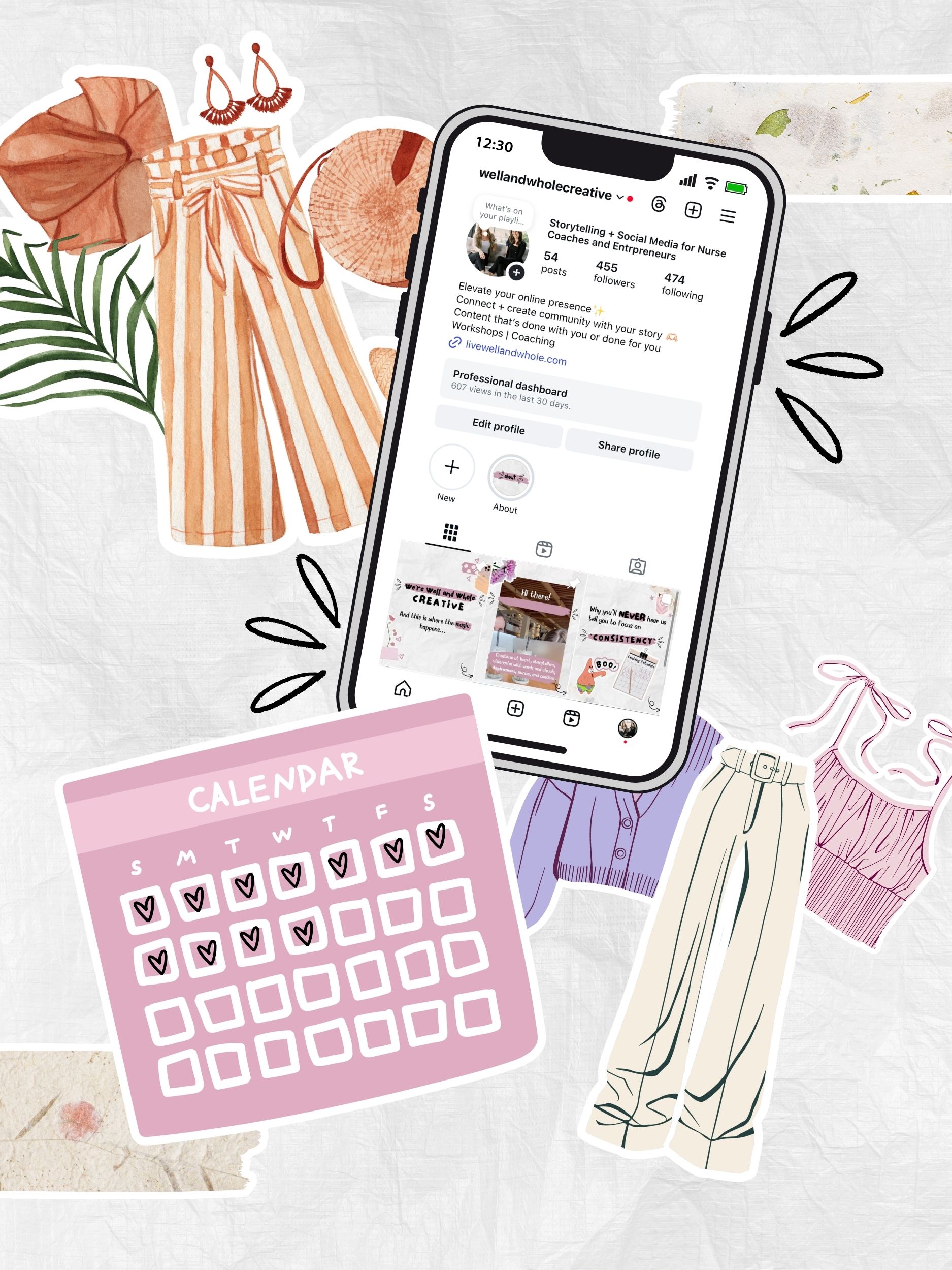First, things first – you need to believe your story is worth telling
When it comes to storytelling, mindset is more important than skillset. Because if you don’t believe this first, you simply won’t share your story.
Worried your story is too ordinary? Too boring? Too mundane? Again, there’s a few mindset shifts needed here. They’re both valid, and they’re going to seem totally opposite… The first being that your story is actually extraordinary and worth sharing, you just don’t know it yet. And the second, people actually do connect to the small, seemingly boring details you take for granted.
We used to be terrible at storytelling
Take it from us, we used to dread sharing our story. Our mentors would constantly tell us we needed to post about our story. And honestly, we only ever had a vague idea about what that meant. We couldn’t see the forest for the trees, so to speak. And we certainly didn’t think we were “providing value.”
Until we each set off on totally different ways of doing this completely unintentionally and unattached to our coaching business. Then we figured it out. For Sara it was telling visual stories on instagram about the process of creating her custom books. And for me it was on Linkedin, sharing reflections, memories, and moments since leaving my hospital nursing job.
Sharing your story is a win for you and for them
When you share your story, it gives your people a chance to find you and say, “me too!” It gives them language to describe something they couldn’t before. And it makes them feel less alone.
It also shows them that you get it. You understand where they’ve been and what they’re going through. And that you care about them as a person. And once you’ve done that, then they’re ready to hear about how you can help.
But good storytelling isn’t all about formats and formulas
You’ve probably heard you shouldn’t go in chronological order, you should start in the middle, you should build tension, follow a hero’s journey, teach a lesson, etc…
Don’t get us wrong, these have a place. And while story flow is important, and yes you want to keep your audience reading, there’s something else that’s missing in a lot of advice about storytelling.
A good story is the one that lights you up
When you’re passionate about the topic, whatever it is, it shows! Your energy is different, and even if your audience can’t put their finger on it, they know. They feel it, they sense it, and they can tell.
How to get started with storytelling in your content
Tell a story with no agenda and zoom way in
Start with just practicing. Get a journal or open a google doc and just write. No agenda, no sales pitch, no lesson right now.
Zoom in. Way in. This is the difference between a laundry list of “this, then this, then this,” and the actual lived experience of a feeling that someone else can relate to. And it’s the same whether written or spoken. Which was re-affirmed to me in a class I took with Ultraspeaking, as well as reinforced by more mentors and courses than we can count!
Instead of googling storytelling hooks…
Just start telling stories! If you’re looking for examples, I’m happy to share. Some of my top performing posts (aka stories) have started like this…
- “March 2025 marked so many big transitions in my life and even 2-ish years later in June, I’m still processing…”
- “Ever since quitting my bedside job and moving to France, I felt beyond disconnected from everything nursing – nurse’s week, and being a nurse included.”
- “Not long after leaving the hospital, I realized I was an emotionally different person. Here’s what happened.”
- “For a while, I’ve been thinking about all the things I love, want to do, and am good at as separate pieces of myself.”
- “A decade ago, I would have never thought I’d be interviewed on podcasts talking about what’s wrong with being ‘a good nurse.’”
- “I used to be famous in the hospital for my outspoken and powerful, yet irrefutable and impeccably professional emails.”
Make reflection on your life and stories a regular practice
Think reflection and connection! First, take time to reflect on your life, things that have happened to you, and your own stories. Things you’ve been through that maybe you didn’t even recognize in the moment, but you thought about later and said, man, that was a lot. Things that might not even feel like a full story in the moment. Like, me having dreams I was still back in the operating room, or realizing I had a habit of telling my husband I would “run to the bathroom really quick” out of habit.
Second, connect! This is the meaning you make from a story – the lesson, the takeaway, the thing that someone else can relate to. Sometimes in sometimes unexpected ways! For example – me losing toenails for all the “right” reasons in Singapore, learning to trust myself from skiing in the French Alps, becoming an amateur sailor in Mauritius and discovering why the quickest way from A to B is usually not a straight line – neither in a boat nor in real life.
We know you have examples in your life. What about something that led you to create your business? The lightbulb moment when you realized something needed to change in your life? How you first knew you were healing something you dealt with forever? Or the moment you realized that you could help someone else because of what you’ve been through?
Think about what your younger self needs to hear
A great prompt reflecting and connecting is to think about what your younger self would need to hear from you. The version of you who wouldn’t believe where you are and what you’ve accomplished now. This version of you could be at any point in time, and will probably be similar to the person you’re aiming to help in your business right now. Whether she’s from 1 year ago, five years, or ten. If you’d like to go deep here, close your eyes and visualize yourself on a coffee date with her (like the viral instagram trend from earlier this year!).
Don’t be afraid to be vulnerable
We often hold back exactly the thing that needs to come out! Yes, it can be scary to be vulnerable and tell personal stories. I’ve experienced this myself. My inner critic used to come up with every excuse in the book and convince me that people close to me would be upset if I was fully open with what I was feeling. For example, it took me a long time after moving to France to talk about the sadness and overwhelm I felt during what looked like a total fairytale from the outside.
We used to focus far too much on sharing “education” and helpful “solutions,” or client stories. And while these have a place, they’re not the biggest thing. They will lack context without your why and they really won’t have anyone saying, “me too!”
It’s not going to hurt your credibility to share these things. In fact, it will humanize you and make the people in your world feel even more connected.
We’d love to help you get started
We have plenty more in the works to help you with this!! Think writing workshops and done-for-you storytelling content packages. Let’s jump on a free 30 min call! Whether you’re looking for some inspiration to discover your own or how to incorporate it into your content, we can help!
Two heart-centered creatives who are doing creativity differently. In our book, storytelling is magic and storytelling is medicine. As nurses and board-certified nurse coaches, our passion is helping nurse coaches and entrepreneurs tell their stories in a way that reflects the extraordinary that was always inside, they just didn’t know it yet.




Comments +